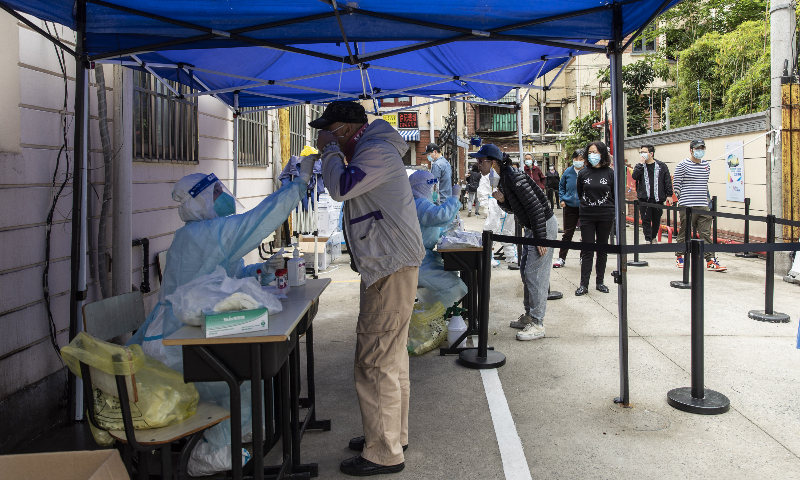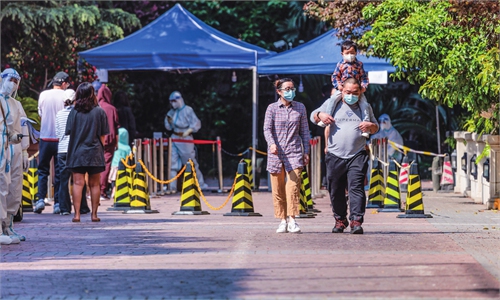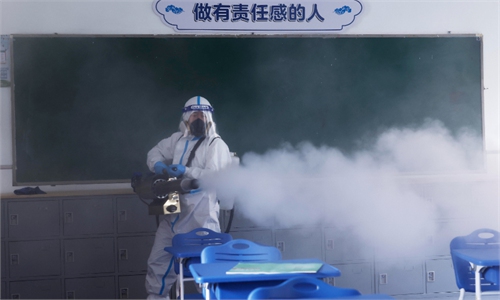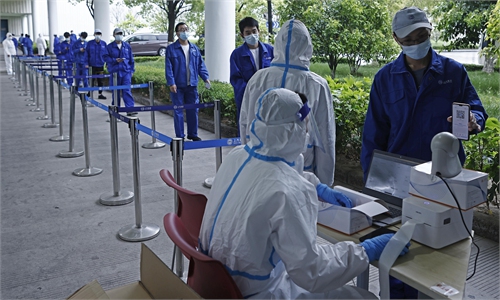New round of citywide nucleic acid testing necessary to stamp out community infections in Shanghai

Residents take nucleic acid tests during a lockdown in Shanghai on April 24, 2022. Photo: VCG
Shanghai will conduct a new round of citywide nucleic acid testing from Tuesday covering all the areas in lockdown, and under control and precaution as part of the new campaign involving “nine major” measures from last Friday to step up the decisive battle to stamp out infections within communities.
The city registered 2,472 confirmed cases and 16,983 asymptomatic carriers on Sunday. Among these infections, 69 confirmed cases and 148 asymptomatic silent carriers were discovered in a mass-screening of at-risk groups.
From Tuesday, all personnel in the locked down, controlled and precaution areas will undergo a new round nucleic acid testing, Zhao Dandan, deputy director of the Shanghai Municipal Health Commission announced at the press briefing on Monday.
As a detection method with high sensitivity to judge whether individuals have contracted the virus, nucleic acid testing has always served as a diagnosis of COVID-19 in China’s COVID-19 diagnosis and treatment protocols, Hu Xiaobo, director of Shanghai Center For Clinical Laboratory said during the press briefing in response to the public’s concerns about the necessity of repeated mass-screening and whether it can be replaced with antigen testing, since the city has been placed under "static management" and residents have been required to stay in their homes for about a month.
Hu explained that nucleic acid testing can more easily detect the virus and the method is of higher sensitivity and specificity.
If the entire procedure can be accurate in all aspects involving sampling, transporting, verification, detection, result interpretation and reporting, the testing accuracy can be very high under ideal conditions.
Hu also noted that the accuracy is also affected by other factors such as the samples’ quality, the temperature and time of the storage of the samples and the operation of the testing process.
Supplementing nucleic acid testing, antigen testing has been adopted in the city-wide mass-screening since it is more swift and convenient in operation compared with nucleic acid testing, which is suitable for self-testing.
However, it has less sensitivity compared with nucleic acid testing. In the initial stage of infection, an infected person does not show symptoms and can test negative in antigen tests. Besides, the accuracy of antigen testing also depends on if the operation is standard. So antigen testing cannot take the place of nucleic acid testing.
Given the incubation period of the course of COVID-19 infections and different viral loads of different individuals, repeated mass nucleic acid testing is necessary to detect those infections with low viral loads as early as possible to dynamically stamp out community infection as soon as possible.
Global Times



